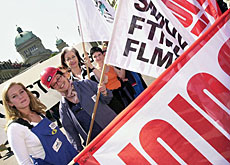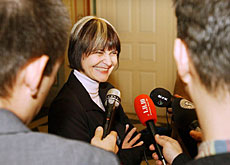Fight for sexual equality goes on

Switzerland’s equality offices - the first of which opened its doors 25 years ago – are still going strong despite a political shift to the right.
But experts say sexual equality is still not a priority, even though it has been enshrined in the constitution since 1981.
The first equality office opened in canton Jura in 1979. Other cantons have since followed suit and a Federal Office for Equality was opened in 1988.
But some of those in charge of equality offices in Swiss cantons complain of budget restraints and a lack of political support.
The head of canton Zurich’s office, Kathrin Arioli, says the rightwing Swiss People’s Party regularly questions whether there is a need for such a service.
But Patricia Schulz, head of the Federal Office for Equality, insists that there is a willingness on the part of the authorities to promote sexual equality.
She cites the fact that moves to close down equality offices in Basel, Bern and Valais were met with considerable opposition.
Schulz admits, however, that many offices are suffering financial difficulties.
Lagging behind
Social Democrat parliamentarian Liliane Maury-Pasquier told swissinfo that Switzerland still had a long way to go before it could claim to be a country of equal rights for men and women.
“Equality has made some progress in Switzerland, but the initial aims are far from being realised,” she said.
Women still earn on average 20 per cent less than men and there is no statutory maternity leave.
Women are also under-represented in politics. Switzerland ranks 26th in the world when it comes to women in parliament.
Maury-Pasquier argues that the problem of inequality lies in the attitudes of society and she estimates that change will take “more than a generation”.
Changing society
Some Swiss employers have been accused of not doing enough to promote the role of women in the workplace.
But Peter Hasler, director of the Swiss Employers’ Association, says there is only a certain amount businesses can do.
“We can’t make women have careers and force men to take part in the housework,” Hasler said.
“As employers we can’t change society, but only provide better conditions for it,” he added.
For Hasler this means equal wages and making it easier for women to combine a career with the task of bringing up a family.
Schulz argues that it is in the interests of Swiss businesses to encourage women to develop their careers.
“If businesses want to avoid the high cost of a large turnover of staff, it would be advantageous for them to adopt working conditions that are favourable to families,” she said.
Natalie Imboden from the Swiss Federation of Trade Unions told swissinfo that part of the problem is that Switzerland is not very family-friendly.
“Equality offices therefore have the role of showing where the problems are and what needs to be accomplished,” she said.
swissinfo
Women in Switzerland were granted the vote in 1971.
Wage gaps between men and women average 20%.
In 2003, Switzerland ranked 26th in the world when it comes to women in parliament.
The principle of equal rights for women and men was enshrined in the Swiss constitution in 1981.
The Federal Law on Equality between Women and Men has been in force since 1996.
The Federal Office for Equality was set up in 1988.

In compliance with the JTI standards
More: SWI swissinfo.ch certified by the Journalism Trust Initiative












You can find an overview of ongoing debates with our journalists here . Please join us!
If you want to start a conversation about a topic raised in this article or want to report factual errors, email us at english@swissinfo.ch.